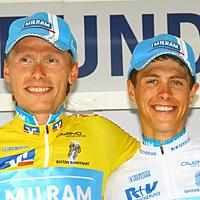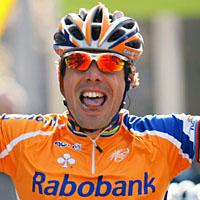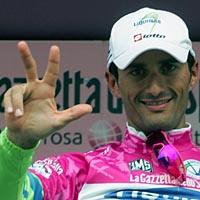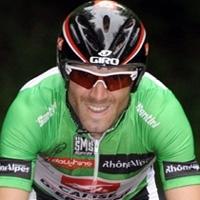News feature, June 25, 2008
Halfway through: A review of the ProTour teams' season to date (Part 3)
What was the first half of the 2008 season like for the 18 ProTour teams? Who can be satisfied with their performance and who needs improvement? Or, as the Cyclingnews staff asked, 'What went right and what went wrong?'
Here is part three of a team-by-team analysis of the first half of the year. The teams are listed in no particular order.
Milram
By Laura Weislo

|
What went right: Aside from keeping Nordmilch AG on as a sponsor with Milram, hardly anything went right in the first half of 2008. Except for Erik Zabel, who won a stage in the Vuelta a la Communidad Valenciana, no other Milram won a race this season until Christian Knees took the overall at the Bayern-Rundfahrt at the end of May. And even then, Knees did not win a single stage. Alessandro Petacchi raised his arms in victory eight times in the early part of the season, but the now ex-Milram rider officially lost those wins when he was suspended after the Court of Arbitration for Sport decided against him in May.
What went wrong: What hasn't gone wrong for Milram? Elia Rigotto was ejected from the Tour Down Under for head-butting Rabobank's Mathew Hayman. Petacchi was suspended ,then fired for puffing too much asthma meds in the 2007 Giro. Igor Astarloa turned up with suspicious blood values and was sacked.
The team also seemed to suffer an inordinate number of injuries and illnesses: Christian Knees and Andrey Grivko hit the deck multiple times, with the latter crashing out of Paris-Nice after wearing the white jersey of Best Young Rider for two stages. Martin Velits broke his wrist and will be out until August, and both Zabel and Ralf Grabsch had knee problems earlier in the year. Fabio Sabatini and Luca Barla were both injured in crashes – the list goes on and on.
Holding out for: Better luck! The team has to get its riders healed up and healthy and in time for the Tour de France. The squad announced its pre-selection for the Tour way back at the start of May, and it is clear that they'll be hunting for stage wins. With a wide-open Tour, Milram will also have ample opportunity to get in breakaways to up their chances for a stage victory or a day or two one of the special jerseys.
They may not have Petacchi for the sprints anymore, so hopes for the green jersey will rest on Zabel, who is an outside chance with Boonen out and Bennati nursing tendonitis in his knee. Zabel has only won the green six times and worn it in eight Tours, so he knows how to finish well. At the very least, they can count on Erik "Herr Zweitens" Zabel to get at least one second place in a bunch sprint.
Overall: The Milram team was built around super-sprinter Petacchi, and now that he's gone they're having to re-invent themselves. With Zabel likely retiring at the end of the season, Milram will rely on its youngsters to step up and take charge. Aggressive riders like Niki Terpstra, Andrey Grivko, Slovakian twins Peter and Martin Velits, Alberto Ongaroto, and Ukrainian Volodymyr Dyudya will be the future of this team. Unless they can borrow a top sprinter or two from Team High Road, which has an excess, Milram will have to find new purposes for lead-out specialists like Marco Velo.
Team Rabobank
By Susan Westemeyer

|
What went right: Oscar Freire continues to show his stuff to advantage in the orange and blue jersey of Dutch team Rabobank. The Spaniard won the opening stage of the Tour de Suisse to take the first leader's jersey, just as he did in Tirreno-Adriatico, where he also won two stages. And he showed his versatility by winning Gent-Wevelgem. Joost Posthuma has been a surprise in the plus category, winning two smaller stage races, the Tour of Luxembourg and the Driedaagse De Panne. The young Robert Gesink continues to shine. He started well in California with a stage win. He had fourth places in the overall in the Dauphiné Libéré and in Flèche Wallone. He finished in the same spot in Paris-Nice, after his inexperiene saw him lose the race lead on the last descent of the week long race. Frequently takes young rider classifications.
What went wrong: Youngster Thomas Dekker has never gotten on track all season. He has no wins but a number of top ten finishes in, for example, Amstel Gold, Flèche Wallonne and Liege-Bastogne-Liege. His inconsistency seems to hang together with health problems. A poor performance in the Tour de Suisse knocked him off the Tour de France squad. Sprinter Graeme Brown brought in one win so far, in Murcia, and came in for some rather pointed criticism from team management in the Giro d'Italia. In addition, the team is awaiting a ruling on Michael Rasmussen's wrongful dismissal suit, with the grapevine saying a finding in favour of the Dane would cause the team to shut down.
Holding out for: Like so many teams – the Tour de France. But unlike so many teams, Rabo has a really good GC candidate in Denis Menchov. He was sixth in the Tour in 2006, and won the Vuelta a España last year for the second time. This year he hasn't raced much yet, but has showed his good form with a fourth overall in the Tour de Romandie and fifth in the Giro.
Overall: Freire carried the team for the first part of the year, and now he will share the task with Menchov. Youngsters Laurens ten Dam and Robert Gesink have brought in wins, presenting the team with hope for the future. It seems unlikely that Brown will have much of a future at the team, while Dekker remains an enigma.
Liquigas
By Gregor Brown

|
What went right: The acid-green team of Roberto Amadio is flying this year thanks to overall wins in stage races and new recruit Daniele Bennati. Italy's 'Benna' looked to be in trouble over the winter with injury, but came back to wave the Liquigas flag high in the Giro d'Italia, taking the points classification and three stage wins. Vincenzo Nibali took the overall and two stages in the Giro del Trentino, Roman Kreuziger won the mountain time trial to win the Tour de Suisse overall, while Michael Albasini placed second overall in the Tour de Luxembourg and Franco Pellizotti was fourth overall in the Giro d'Italia. Francesco Chicchi and Filippo Pozzato helped raise the roof with wins of their own.
What went wrong: Not a whole lot went wrong for Liquigas, but if we can nit-pick it would have to be the lack of a big win by Pozzato, the bad publicity with signing Ivan Basso, a lack-lustre showing in the Spring Classics and Pellizotti's Giro (he did take the Plan de Crones stage win, but an overall podium position would have also been nice).
Holding out for: The team will need to come away from the Tour de France with something; stage wins from 'Pippo' and 'Benna' are almost expected, while a solid overall spot from 22 year-old Kreuziger would be an added bonus. Liquigas will also be looking forward to the Japan Cup, the race should mark the return of Basso, who was banned from the sport until October 24 for being hitched to Operación Puerto.
Overall: This is a strong team through and through. It could use a contender for the GC in a Grand Tour, but may have found the answer with the rise of Kreuziger and the return of Basso.
Caisse d'Epargne
By Bjorn Haake
|
|
What went right: Caisse d'Epargne had a good first part of the season, with wins pouring in as early as in the Trofeo Pollença in February, via fastman José Joaquín Rojas. But it wasn't just a one-man show, with Daniel Moreno, Spanish time trial champion José Ivan Gutierrez, national road champion Joaquím Rodriguez and Luis Leon Sanchez Gil all delivering for the team.
Its star rider, Alejandro Valverde also had a stellar season so far. He won 'his' race at home, the Vuelta a Murcia, but also piled up victories in neighbouring France, in one day races like Paris - Camembert Lepetit, but more importantly he showed that he is on track for the Tour de France by winning the Dauphiné Libéré.
Valverde also saved the Classics season for the team by winning Liège-Bastogne-Liège.
And, fortunately for the team and Valverde, 'Piti' is not mentioned and is almost forgotten.
What went wrong: Badly timed crashes didn't fare well with the team. Sprinter José Joaquín Rojas was out for the spring after going down in February. A big crash a day ahead of the Giro d'Italia left half the squad bruised and battered and David Arroyo had to be replaced in the last minute. But Pablo Lastras was the worst affected by an ill-timed accident. He was in the winning break of three in the 11th stage of the Giro d'Italia, when Fortunato Baliani fell down right in front of him. Lastras didn't go down but he had lost all chances of winning, with Alessandro Bertolini taking advantage of the situation.
Holding out for: Clearly, the Tour de France is the big objective heading into the second part of the season. Valverde has shown that he is in good shape and he has a strong team to his disposal. While the Spaniard has made a major improvement in the race against the clock, he may not mind the shorter time trial distances this year. The second major goal for the team will be the Vuelta a España in the fall.
Overall: The team has had solid performances, won early races, stage races and a Spring Classic – one cannot ask much more. But if at the end of the season Caisse will call 2008 a success depends a lot on the Tour de France. Valverde is up for the challenge, but if the team is ready to support him in the mountains remains to be seen.
Photography
For a thumbnail gallery of these images, click here
Images by AFP Photo
- Alejandro Valverde has a good season and hopes to be a contender in the Tour de France.
Images by Sonja Csury/www.allaboutcycling.de
- Christian Knees (l) and Niki Terpstra are the future of Milram.
Images by Roberto Bettini/www.bettiniphoto.net
- Oscar Freire keeps Rabobank's victories account filled throughout the season.
- Daniele Bennati piled up three wins in the Giro and added to Liquigas' successful 2008 season so far.


